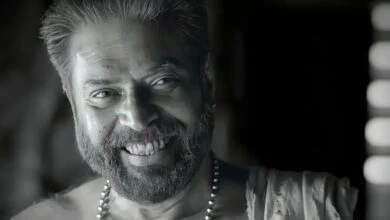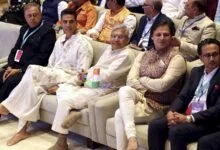2 movies on pursuit of happy life and distractions in between helobaba.com

Near the end of the Korean-English film ‘Past Lives’ (2023), Hae-sung (Teo Yoo) tells his childhood sweetheart Na-young (Greta Lee): “To Arthur, you are someone who stays.”
Arthur (John Magaro) is Na-young’s American husband. The three of them are sitting at a bar in New York, drinking late into the night. Hae-sung, an engineer in South Korea, has come to the US to meet Na-young. He will leave early the following day, and they will probably never meet again.
About two decades earlier, Hae-sung and Na-young meet in Seoul as pre-teenage classmates at school. They feel such a deep connection that Na-young declares to her mother: “I’ll marry him.” But when Na-young’s family migrates to Canada, they lose touch.
They reconnect online 12 years later. Nora – as Na-young is now called – is an aspiring playwright in New York; having finished his mandatory military service, Hae-sung is studying engineering. Their exhilarating reunion is marked by night-long, time zone-defying Skype calls that anyone who has been in an inter-continental, long-distance relationship will instantly recognise.
But advanced communication technology is no substitute for a real-life alternative. Just before going to a writers’ retreat at Montauk, Nora breaks up with Hae-sung. She tells him that she wants to concentrate on her life in the US, make something of it.
Ambition is a guiding force for Nora throughout her life. When a friend in school asks her why she is going to Canada, she makes no excuses: “I’m going because no one in South Korea wins the Nobel Prize for literature.” Nora does not plead helplessness at the decision of her parents to uproot her and take her to an alien shore; she is clear in her head that she is going because she wants to win the Nobel Prize.
Twelve years later, when she is a budding writer, Hae-sung asks her if she still wants to win a Nobel. Nora replies that she wants a Pulitzer now. And another 12 years after that, when they finally meet in New York, Hae-sung asks her: “What prize do you want to win nowadays?” After a slight hesitation befitting a person in their mid-30s, Nora replies: “A Tony.”
Nora’s ambition is visually represented as well. Earlier in the film, written and directed by Korean-Canadian-American playwright and filmmaker Celine Song, Hae-sung and Na-young, both 12 years old, are returning from school on the day she reveals that she is going away from Seoul. They reach a fork in the road and bid each other goodbye. Na-young takes the elevated road, which is composed of stairs, while Hae-sung continues on his regular path.
Two decades later, when they meet again, Nora’s husband Arthur is, naturally, a little jealous. But he realises it would be foolish to ask his wife not to meet her childhood sweetheart. “It’s not like you are going to run away with him,” he says. When Nora does not reply immediately, he pauses for a second and asks: “Are you?” His wife replies ironically: “Definitely. I am going to throw away my life here and run away with him to Seoul.” She pauses and asks: “Do you even know me? I’m not going to miss my rehearsals for some dude.”
Driven by the earnestness of an immigrant, Nora will always take a pragmatic decision. She never has and never will surrender to the impulse of love, she will never make herself vulnerable.
And yet, love does demand vulnerability. Polish theatre director Jerzy Grotowski, in his seminal work Towards a Poor Theatre, writes: “The actor’s act – discarding half-measures, revealing, opening up, emerging from himself as opposed to closing up – is an invitation to the spectator. This act could be compared to an act of the most deeply rooted, genuine love between two human beings.” Grotowski’s advice is for actors, but also for lovers. He is suggesting that an actor has to make themselves vulnerable to be true artists – “revealing, opening up”. So must one who desires to be genuinely and deeply in love.
In the Hindi film ‘Three of Us’ (2023), serendipitously similar to ‘Past Lives’, Shailaja (Shefali Shah), an early-stage dementia patient, asks her husband Dipankar (Swanand Kirkire) to take her to Vengurla, a rain-soaked small town on the Konkan coast about 500 km south of Mumbai where they live. As a child, Shailaja had spent a few years in the town.
It seems like an impulsive decision. “Why do you want to go there?” asks Dipankar. “Even I don’t know,” replies Shailaja. On arriving in the town, Dipankar, and the audience, learn that Shailaja has come to Vengurla to look for her childhood sweetheart, Pradip (Jaideep Ahlawat).
As Pradip and Shailaja reconnect, especially over his poetry written evidently for her, Dipankar feels a flash of jealousy. “Have you ever been this happy with me?” he asks his wife. He feels insufficient to provide a happy life for his wife. “I have come to my childhood home, so I am very happy,” says Shailaja. “This does not mean I was not happy with you.”
What does it really mean to have a happy life? Ancient Greek philosophers used the idea of eudaimonia to explain it. In ‘Nicomachean Ethics’, Aristotle defines eudaimonia as flourishing or fulfilment. “Clearly by ‘happiness’, Aristotle is not speaking of any kind of mental state, still less of one where subjects’ self-reports are invited and treated as definitive,” write Lesley Brown and William David Ross in their introduction to an English translation of the book.
For Aristotle, happiness is to be achieved by rational activity, by fulfilling a function or task. Also, it must be self-sufficient: to explain this, Aristotle dismisses the idea of the pursuit of wealth as a condition for a happy life because wealth is pursued for reasons other than itself.
Perhaps the self-sufficiency that Nora and Shailaja enjoy in their quotidian married and working lives is in itself an example of eudaimonia. It leaves little room for other distractions.
Uttaran Das Gupta is a New Delhi-based writer and journalist. He teaches journalism at O P Jindal Global University, Sonipat
First Published: Jan 12 2024 | 3:38 PM IST









